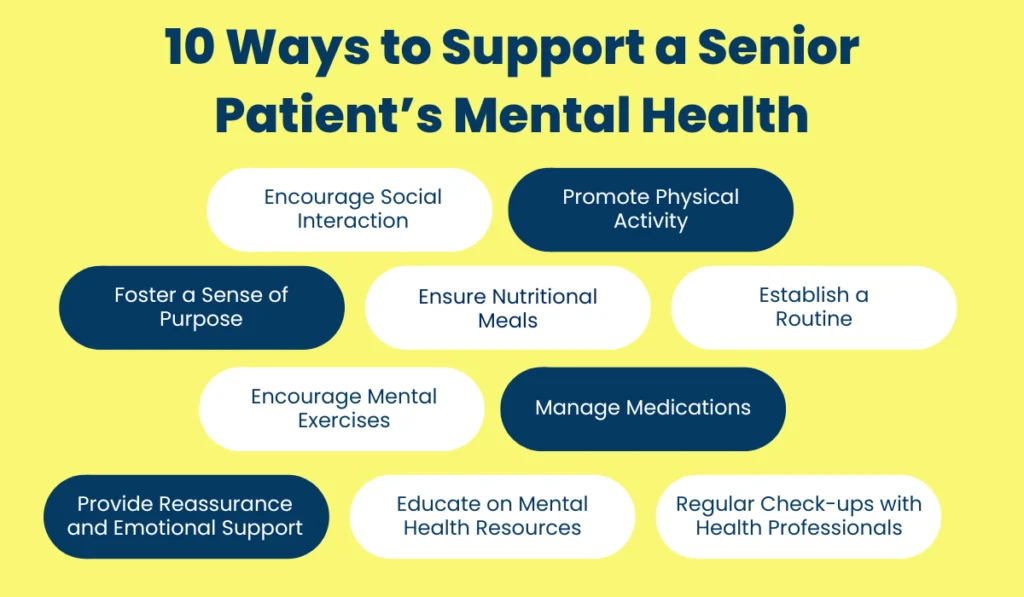Good mental health is vital at any age. But for older adults, it’s crucial. In fact, about 14% of seniors 60 and over have a mental disorder. So, as caregivers and family members, it’s critical to understand how to support their mental health and quality of life.
Today, we’ll explore tips to boost mental health and wellness for seniors. From engaging in social activities to understanding senior mental health needs, the following advice can improve the lives of your elderly loved ones.

1. Encourage Social Interaction
Staying connected with friends and family provides numerous benefits. It offers emotional support, increases happiness, and fosters a sense of belonging.
Regular visits, frequent phone calls, and active participation in social groups (even through social media) are critical.
Social outings are also a great way to maintain healthy social connections. These activities strengthen relationships and boost mental well-being. All in all, prioritizing social support can significantly improve life satisfaction for your older loved ones.
2. Promote Physical Activity
Physical health is closely linked to mental well-being, especially in seniors. Regular exercise can improve mood, reduce anxiety, and enhance overall cognitive function. Some examples of senior-friendly exercises include:
- Walking: Boosts cardiovascular health.
- Yoga: Enhances flexibility and reduces stress.
- Light aerobics: Improves endurance and energy levels.
Generally speaking, exercise supports healthy aging and improves mental health. So it’s perfect for helping older people keep their bodies strong and mobile. A side benefit is it can reduce home health care costs as your senior becomes more physically independent.
3. Foster a Sense of Purpose
Engaging in hobbies and activities provides a sense of accomplishment. This could include learning new skills like an instrument, mastering a craft, or participating in volunteer work. Such activities foster personal growth and can contribute positively to the community.
Encouraging seniors to use their unique skills and talents creates a fulfilling and rewarding experience. Joining relevant groups can also help reduce feelings of social isolation.
4. Ensure Nutritional Meals
Nutrition plays a vital role in mental health, influencing mood, memory, and overall cognitive function. A balanced diet rich in omega-3 fatty acids, antioxidants, and vitamins can support brain health. A few easy-to-prepare, nutritious meals include:
- Oatmeal with berries and nuts
- Grilled salmon with leafy greens
- Yogurt with fresh fruit
Incorporating these foods is great for mental clarity and emotional well-being. Also, aim to include lots of fruits and leafy, green vegetables while limiting salt and processed foods to prevent heart disease.
5. Establish a Routine
A daily routine is great for mental stability. It provides structure, reduces stress, and helps manage time efficiently.
Start with consistent wake-up and sleep times, regular exercise, and allocate time for relaxation. Remember to incorporate enjoyable activities while limiting sudden changes in routine.
This creates a comforting and predictable environment, helping maintain control and balance.
6. Encourage Mental Exercises
An active mind is crucial for overall well-being. So, encourage activities such as puzzles, reading, or memory games to enhance cognitive function and mental agility. This mental stimulation helps to improve memory, reduce stress, and keep the brain sharp. Make it a habit to incorporate these activities into their routine.
Great games include crosswords, sudoku, and other simple games you can play without tech know-how. This practice can lead to a happier, healthier mind for your loved one.
7. Manage Medications
Proper medication management is vital for mental health. It ensures that prescribed treatments are effective and potential symptoms are controlled. The main strategies are setting timely reminders, using pill organizers, and maintaining a consistent schedule.
Also, regular consultations with healthcare providers can address concerns or side effects. Be sure to schedule a check-up if any issues arise or if there are changes in their condition.
8. Provide Reassurance and Emotional Support
Emotional support is crucial in managing age-related changes and challenges. Regular check-ins and active listening can make a significant difference. By consistently engaging with them, you show their feelings and concerns are valued.
This support helps alleviate anxiety, fosters a sense of belonging, and encourages a positive outlook. In all, ensuring they feel heard and understood is essential to emotional well-being and overall quality of life.
9. Educate on Mental Health Resources
There are many available mental health resources for seniors. These can be found online or accessed via phone. Here are a few valuable resources to consider:
- 988 Suicide & Crisis Lifeline: This is a free service offering around-the-clock emotional support for those in crisis. Simply call or text 988 for immediate help.
- Healthy Aging: The U.S. Department of Health and Human Services resource offers various health tips and services tailored for older adults.
- Veterans Crisis Line: This specialized hotline provides confidential support for veterans of all ages. You can reach out by calling 988 and pressing one or by texting 838255.
10. Regular Check-ups with Health Professionals
Encourage regular mental health screenings and visits to health professionals. Professional assessments are crucial in maintaining mental wellness, as they identify potential issues early, offer personalized care plans, and provide ongoing support.
These evaluations help individuals understand their mental health status, manage stress, and develop coping strategies. You can make this easier with help from professional home care services as well.
| Please note that the content provided on this blog is for informational purposes only and is not intended as medical advice. Always consult a healthcare professional before making any decisions about your health. |